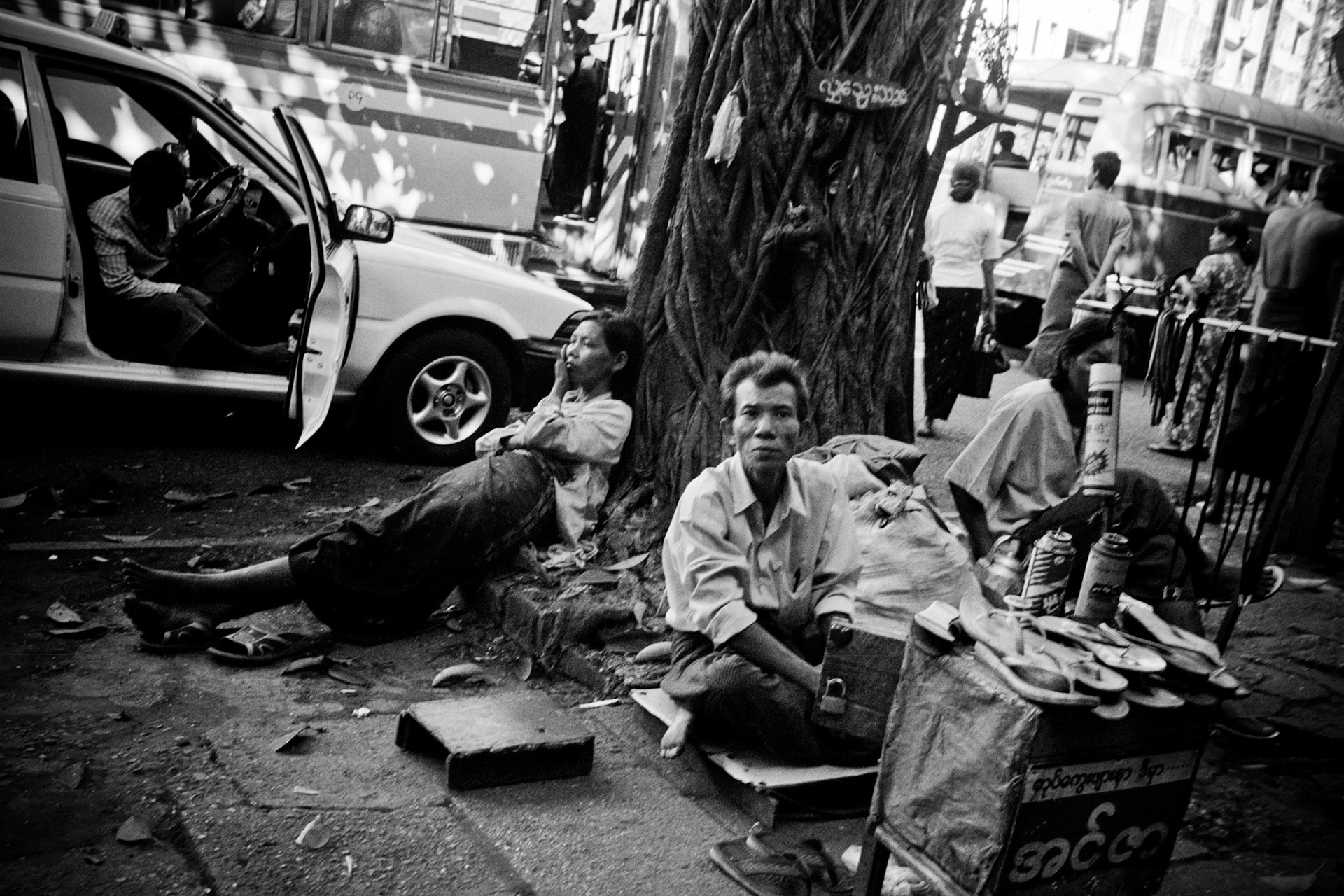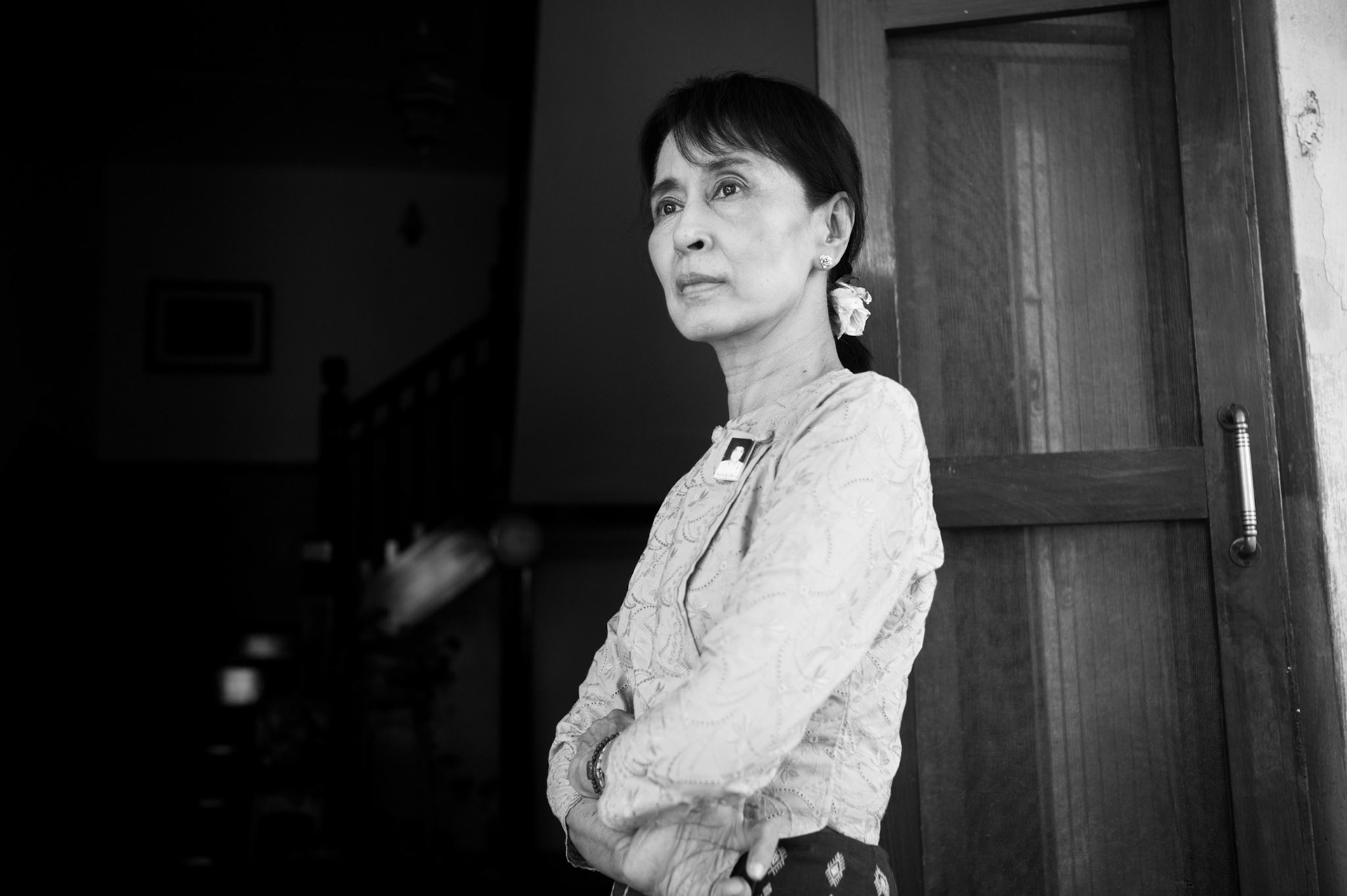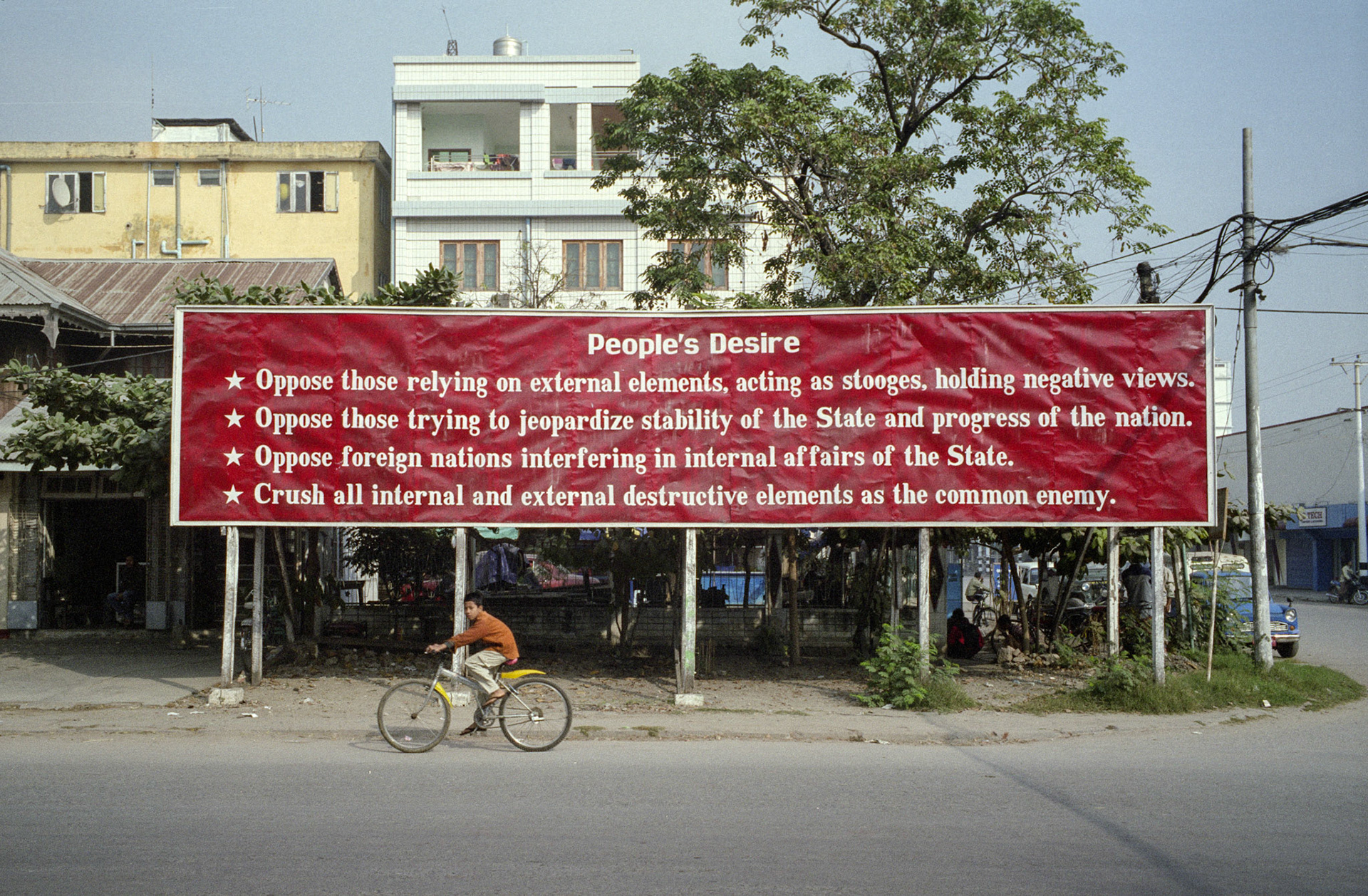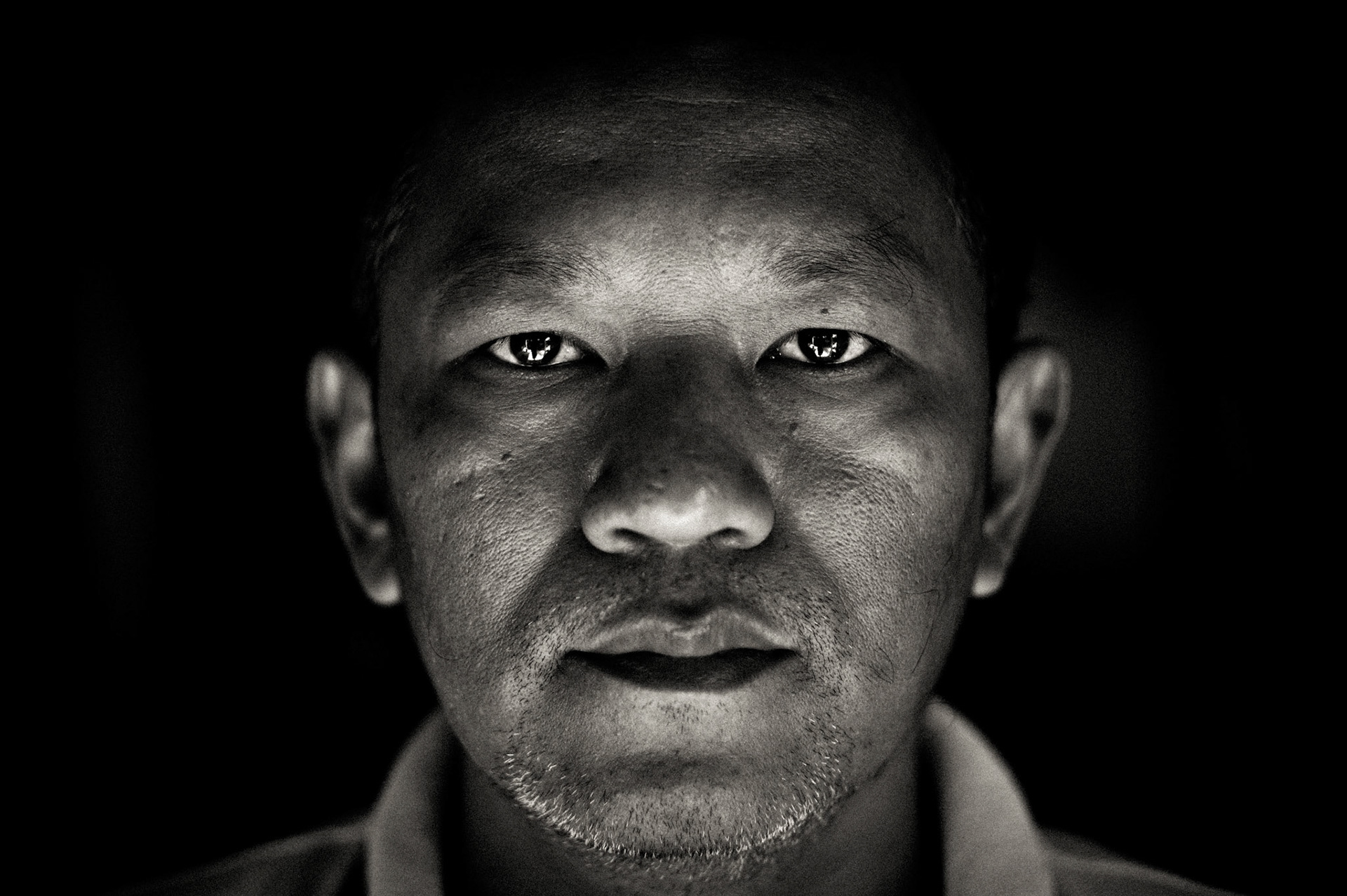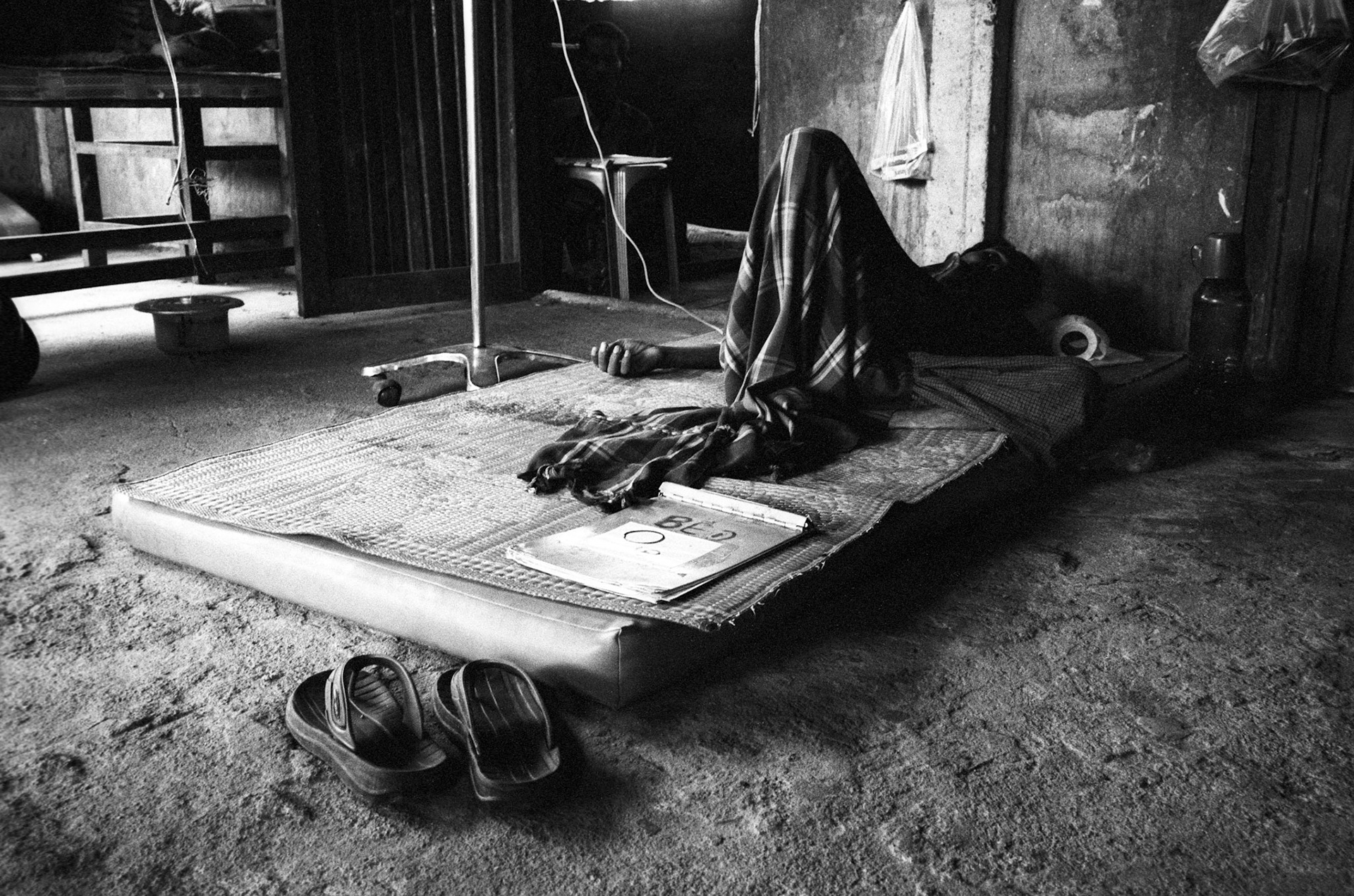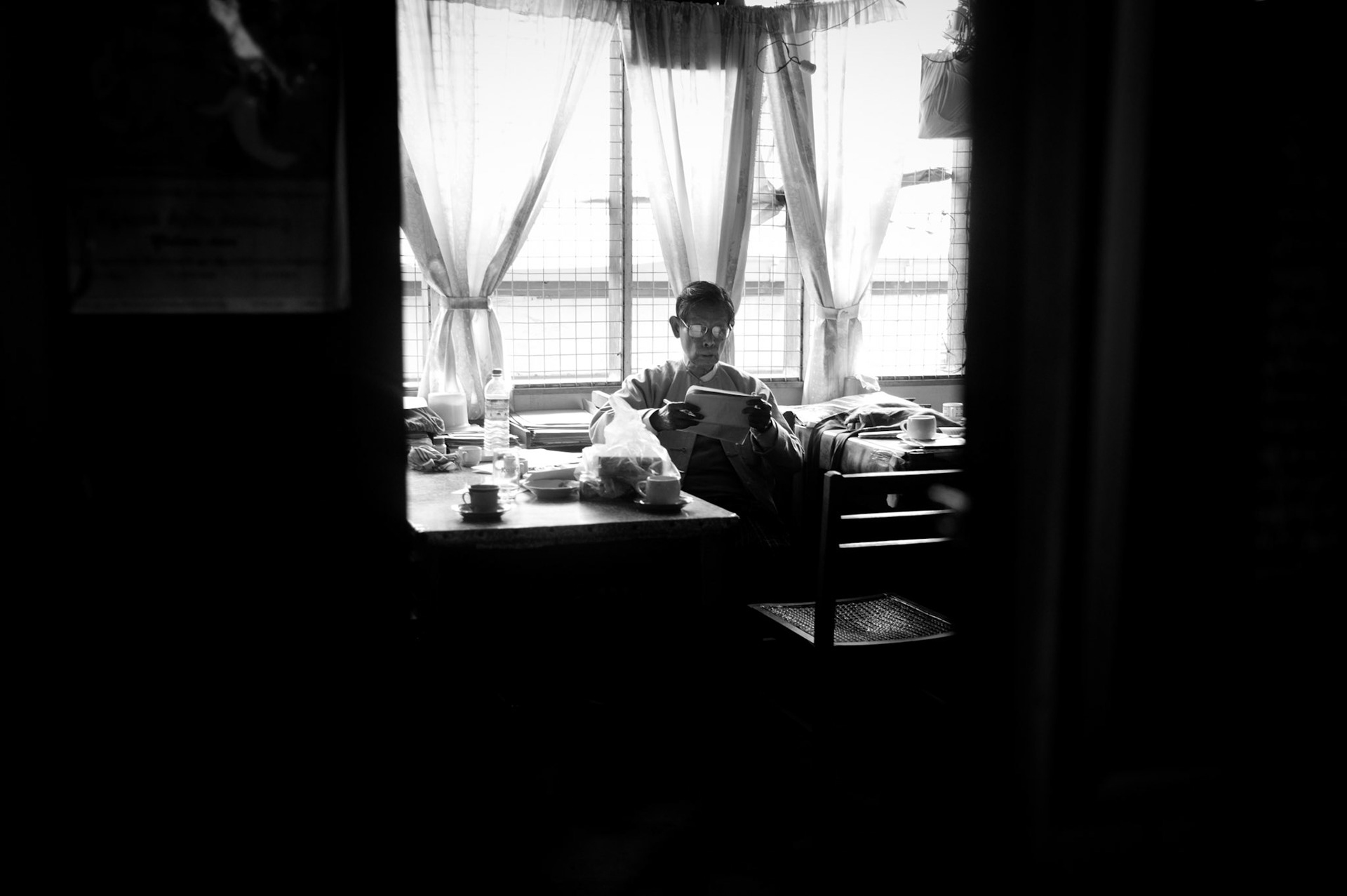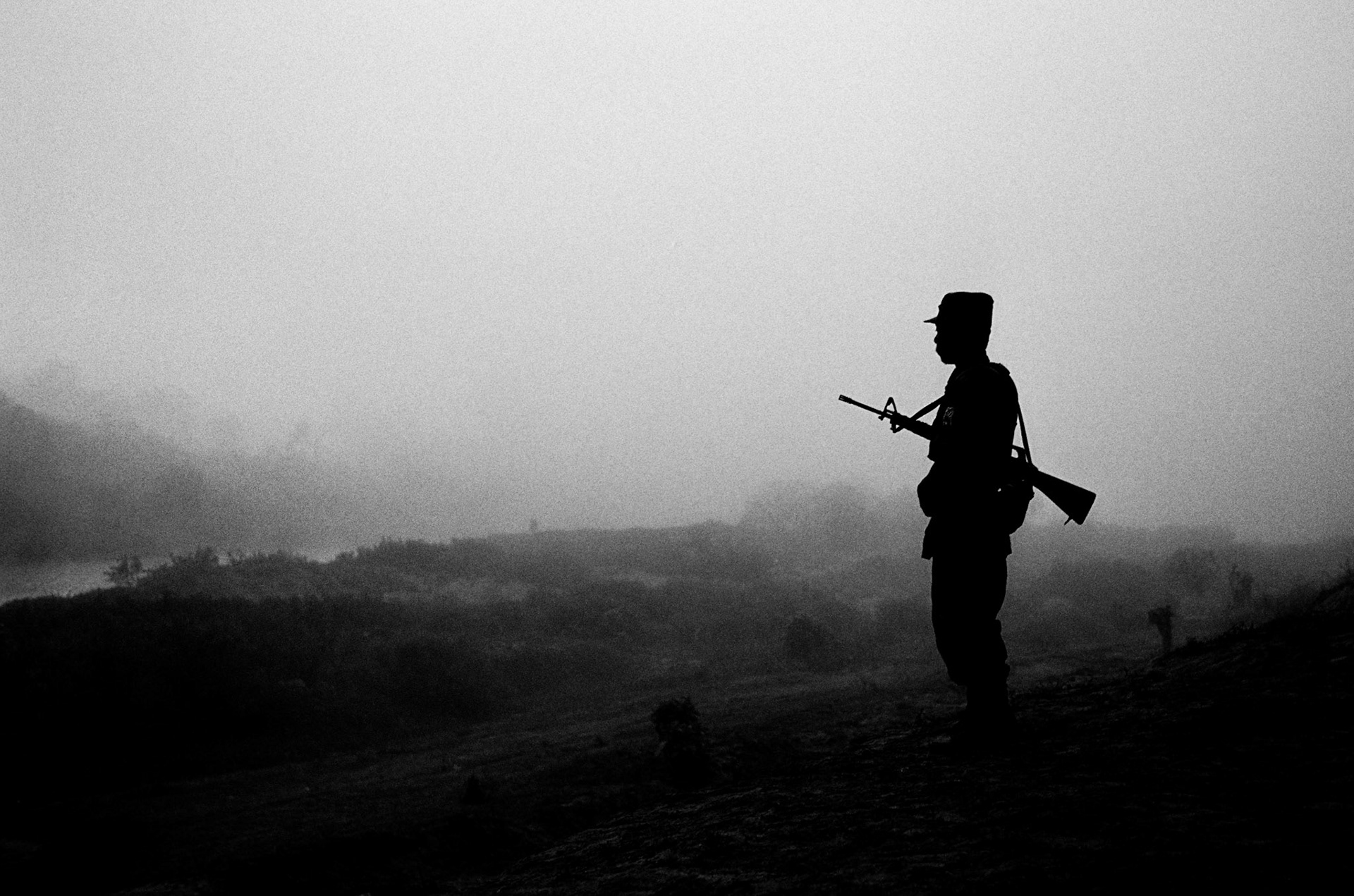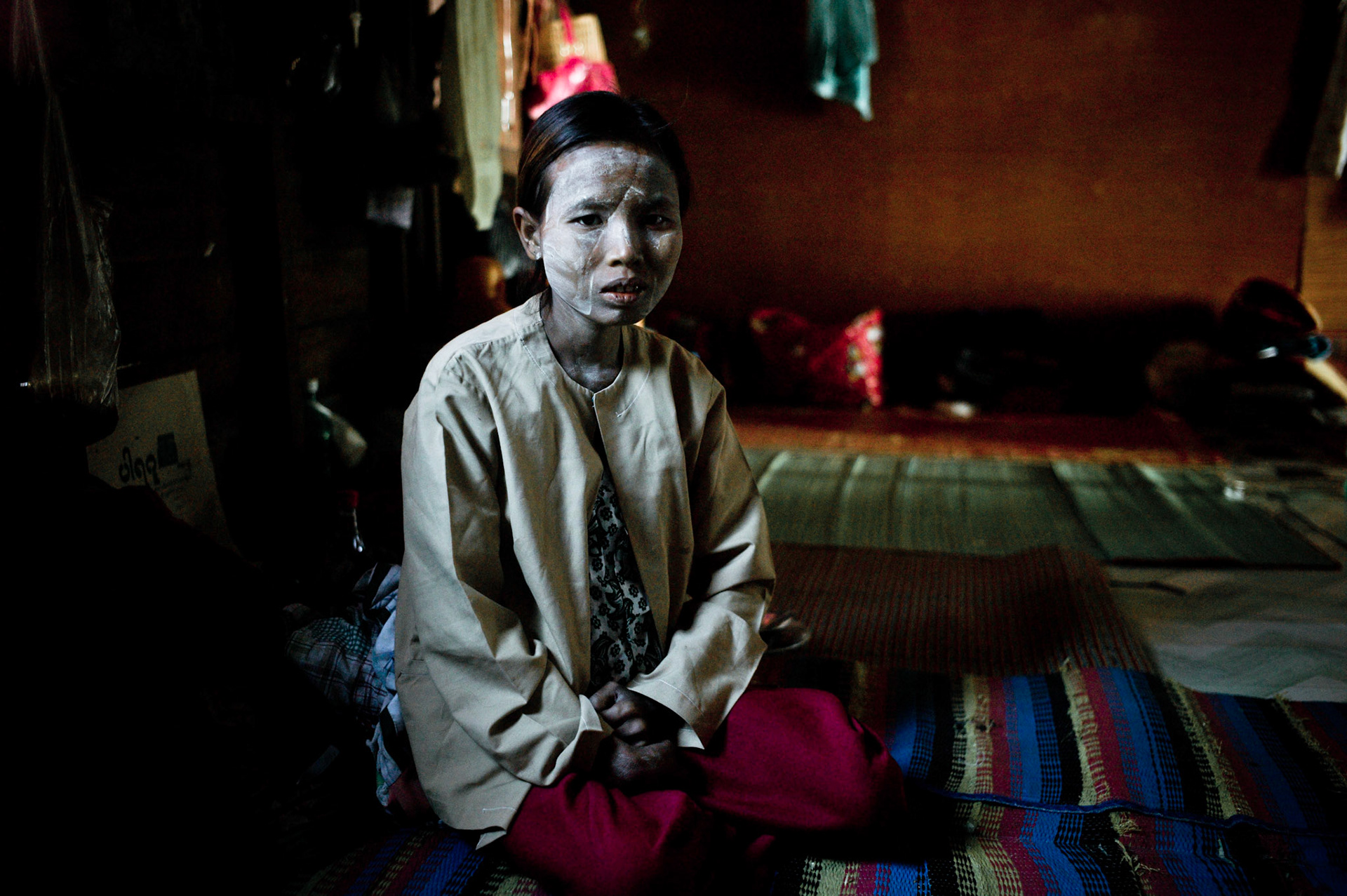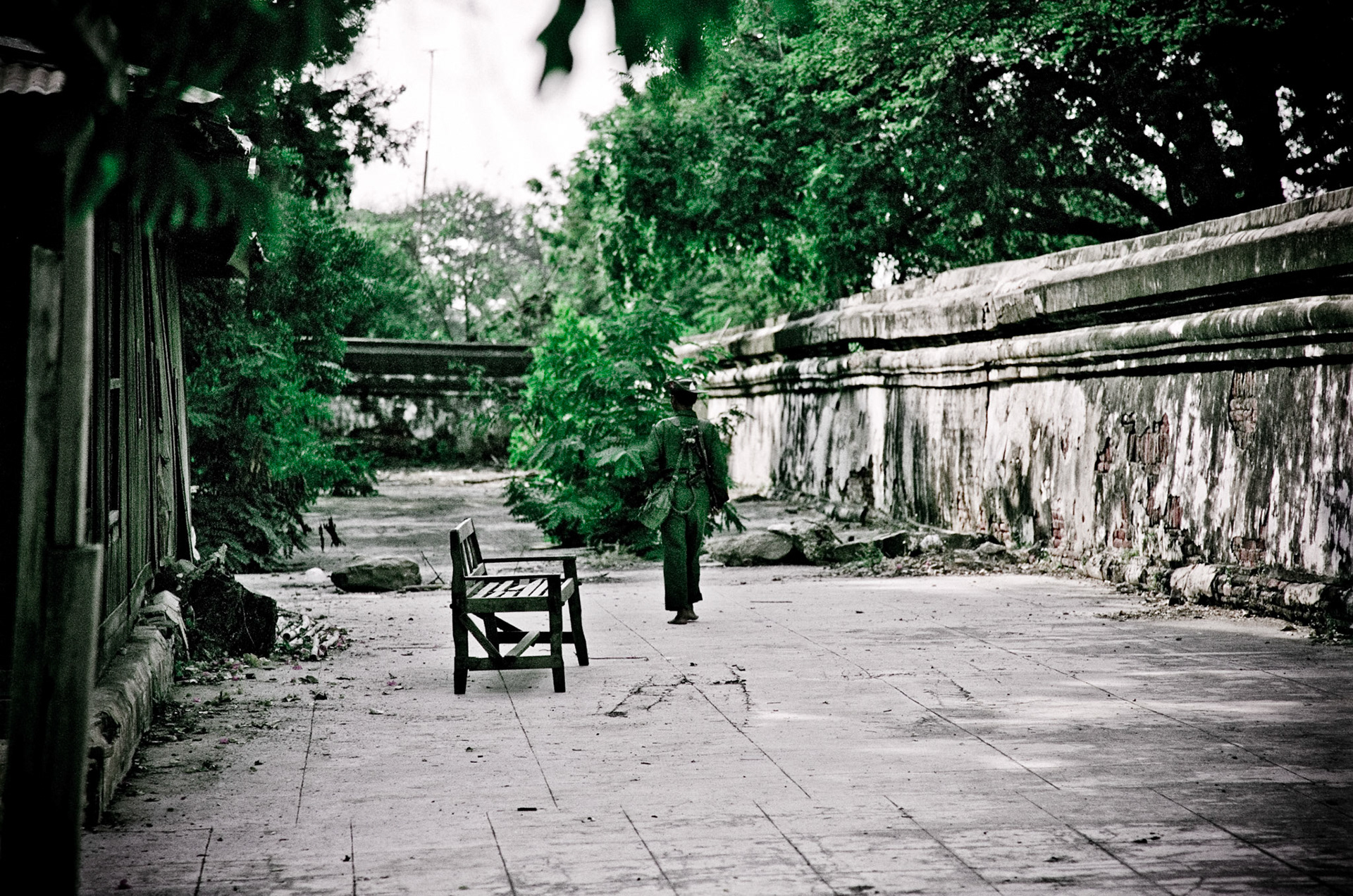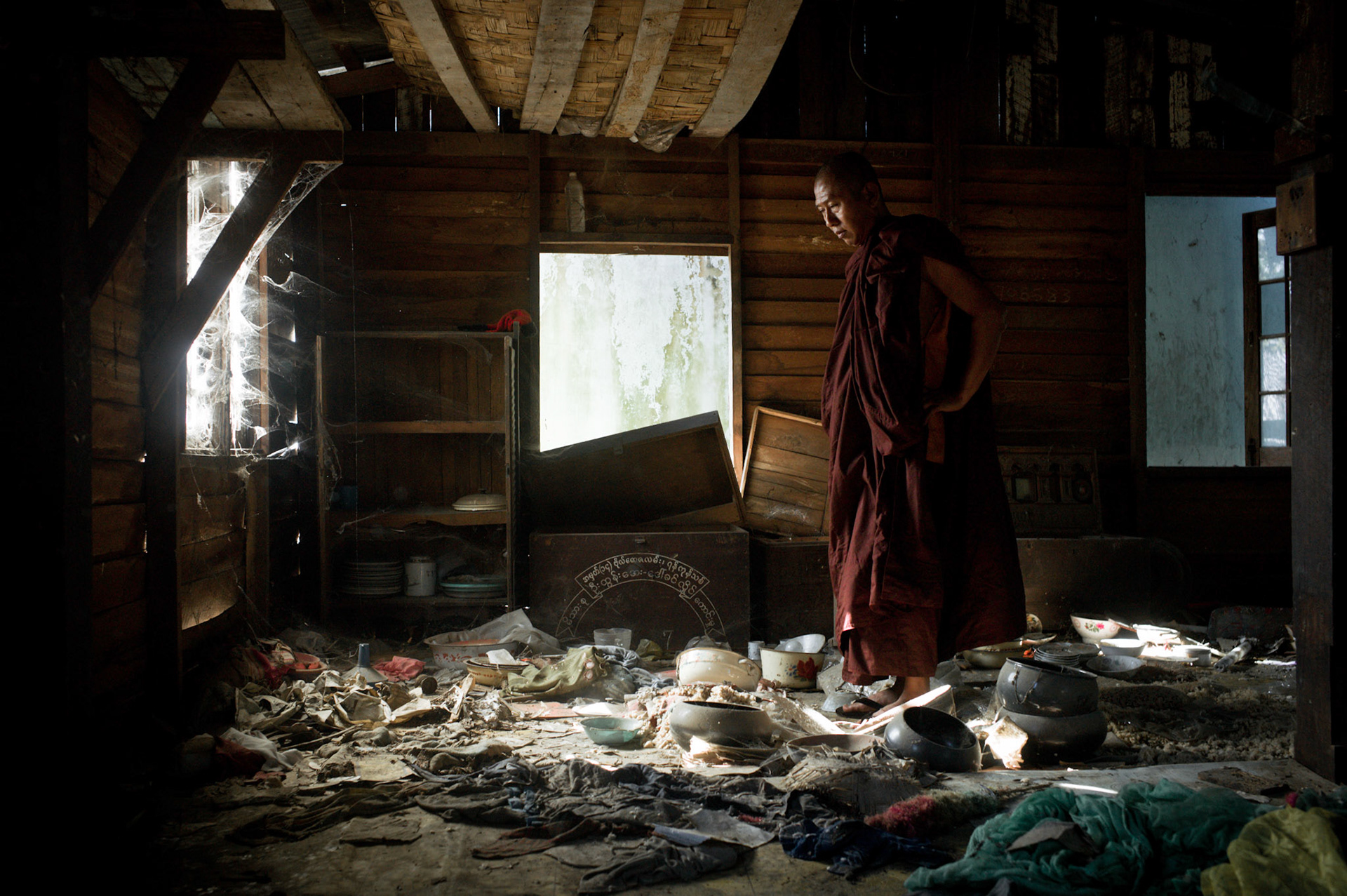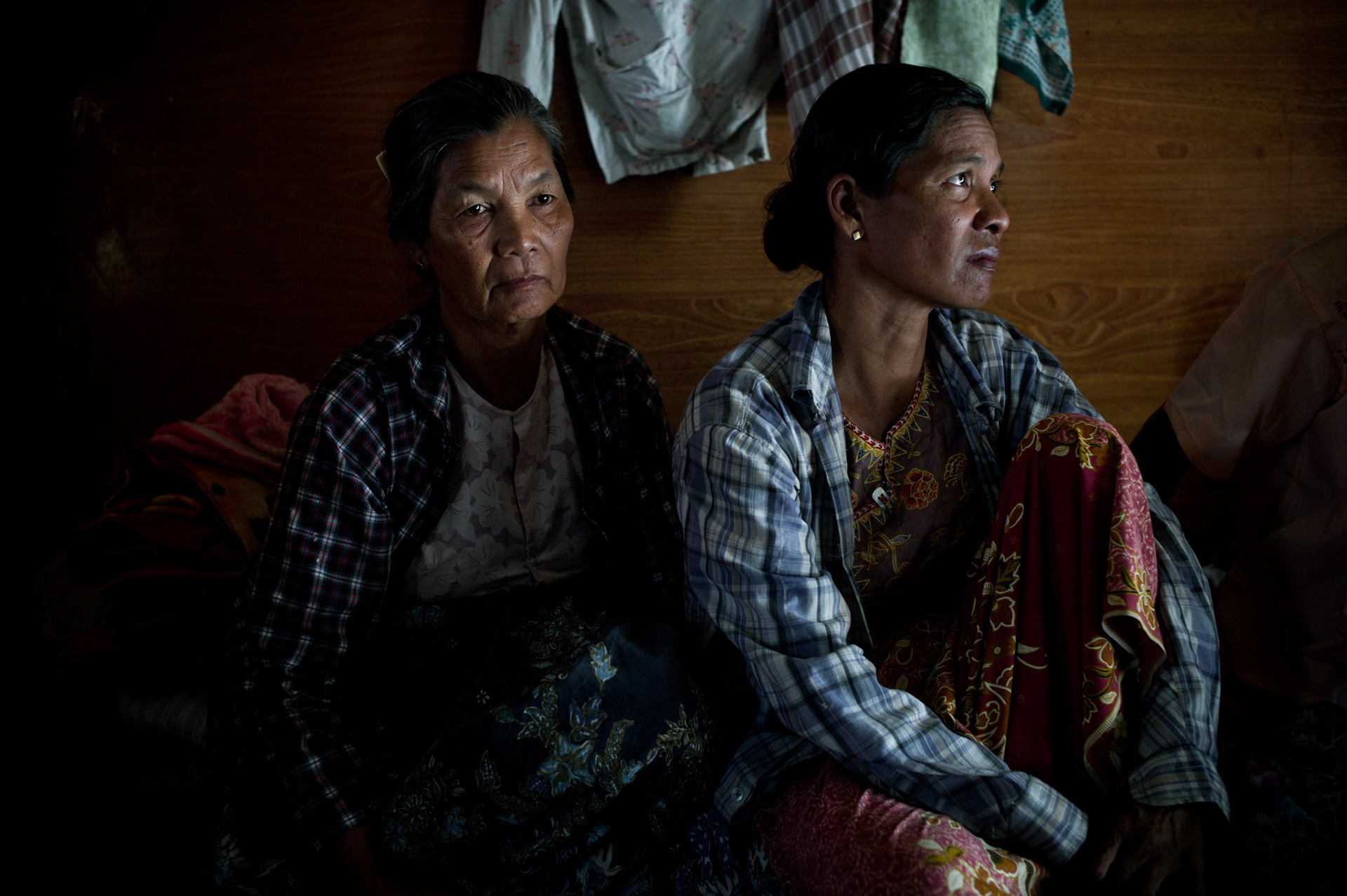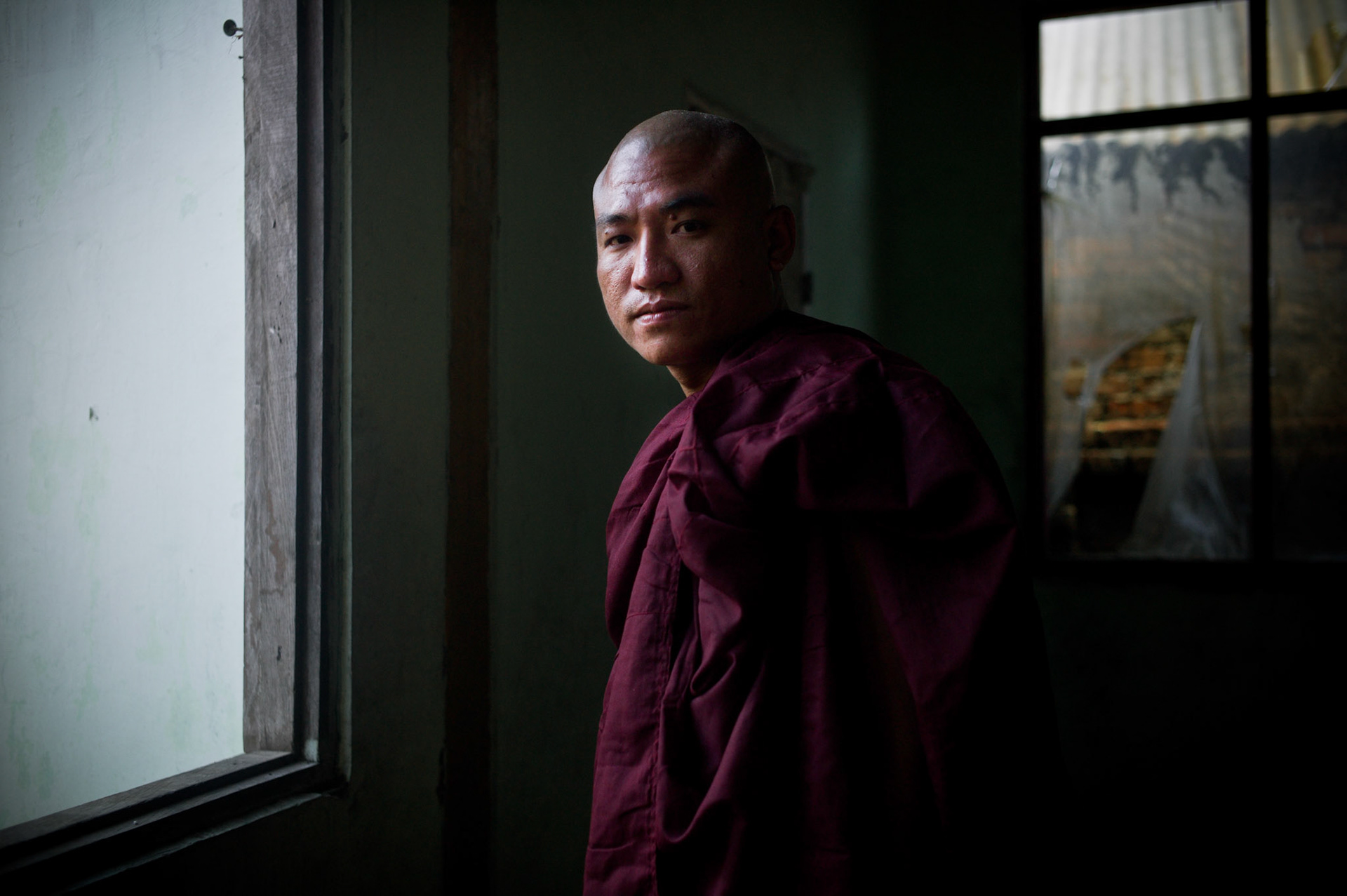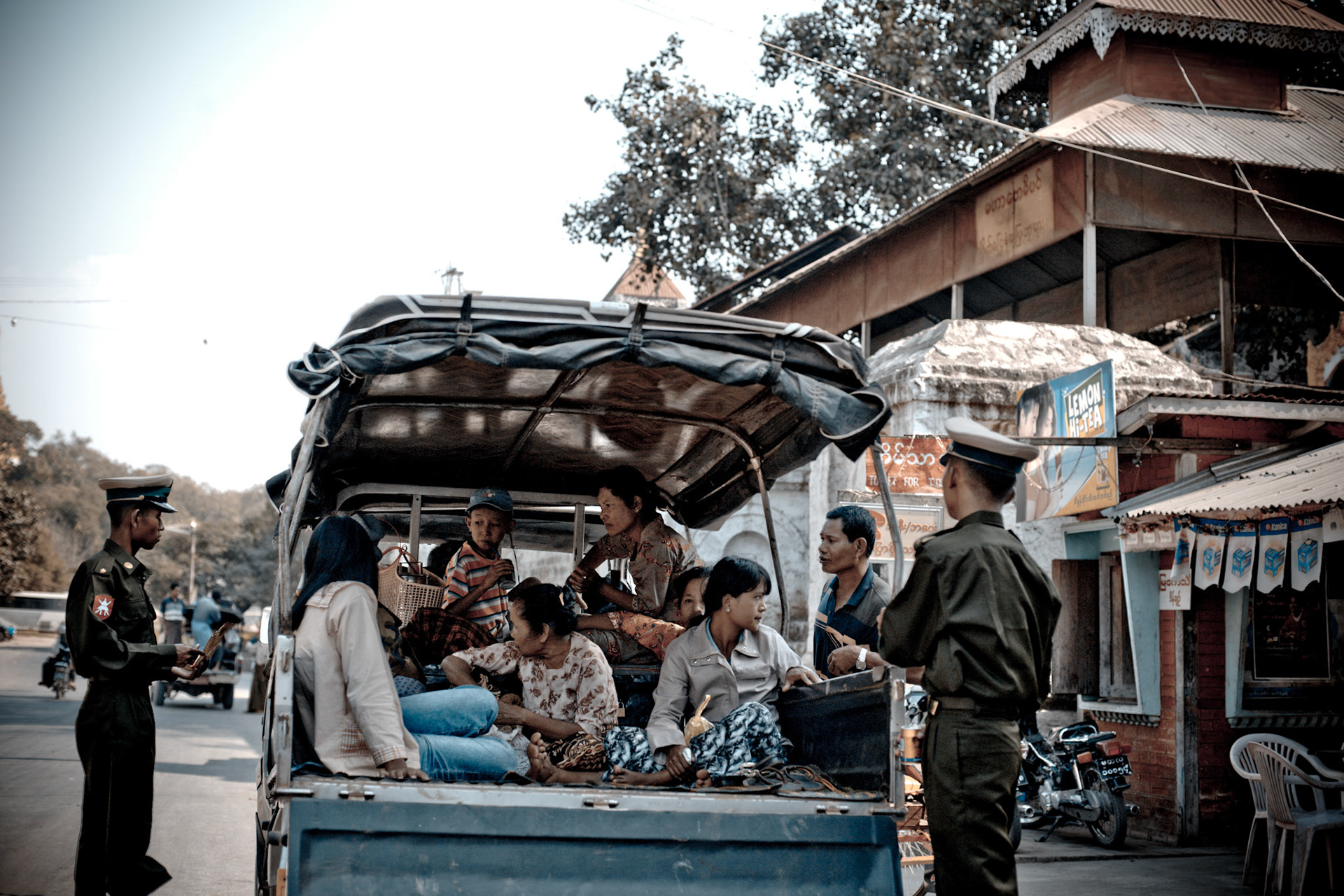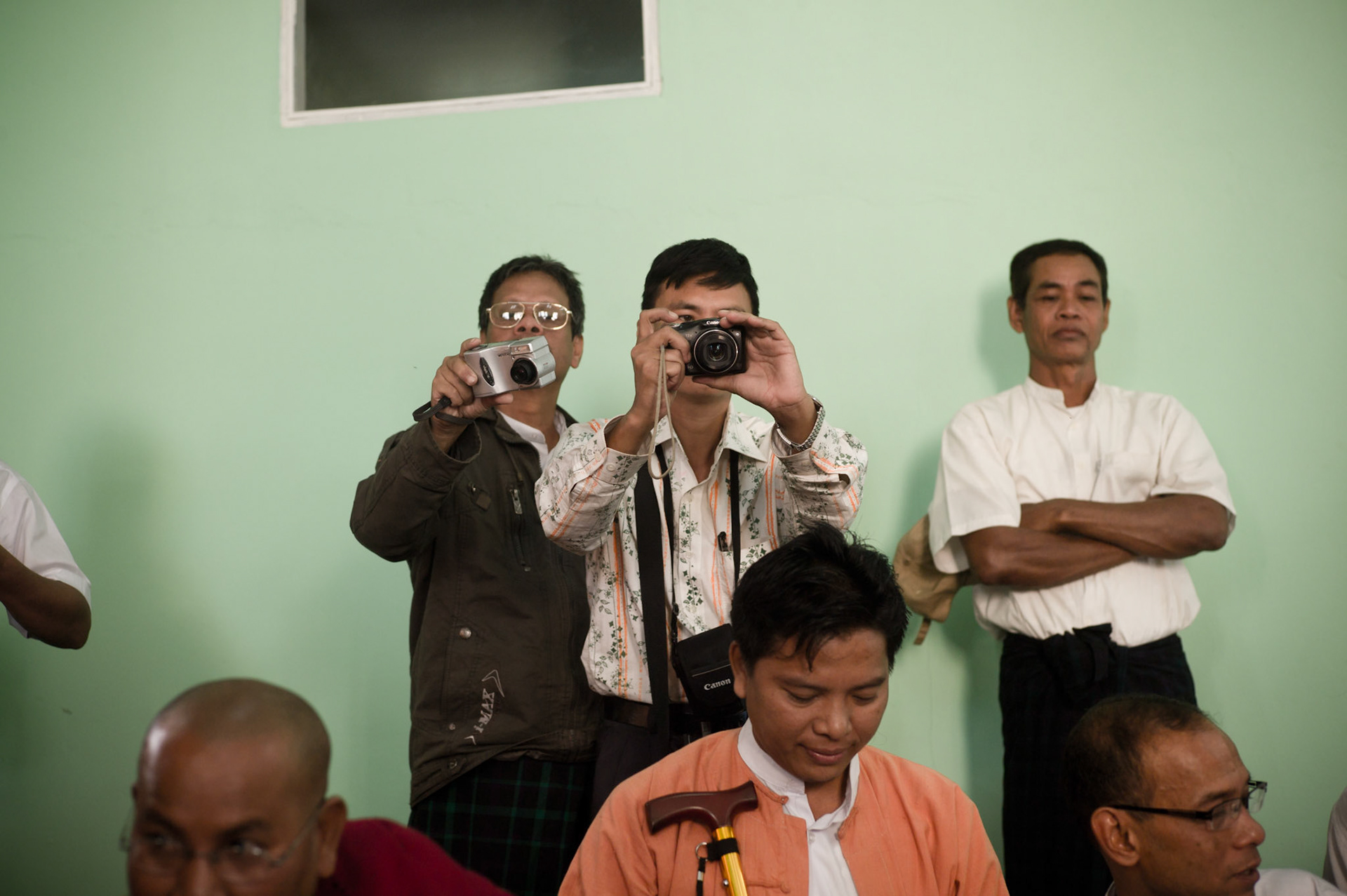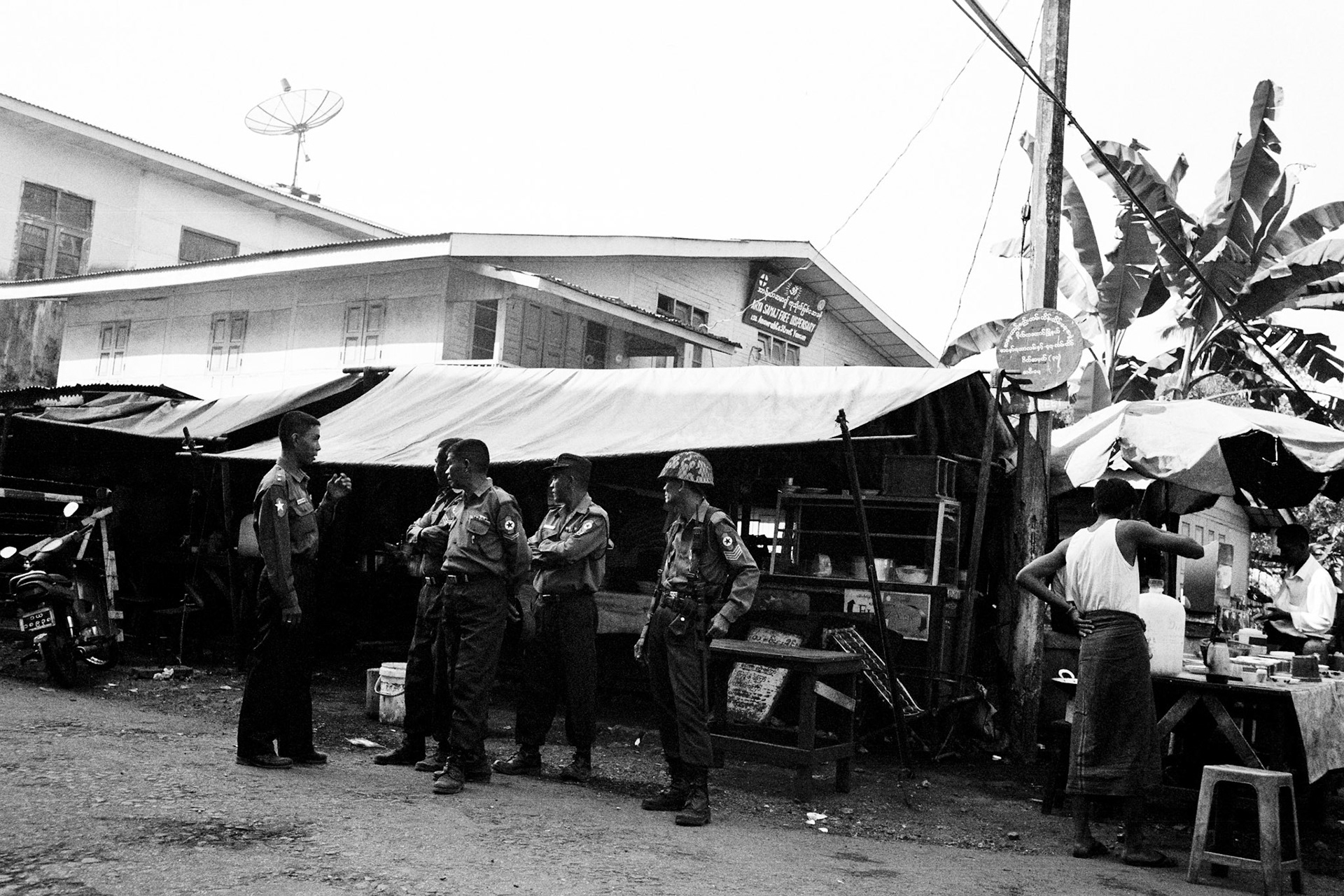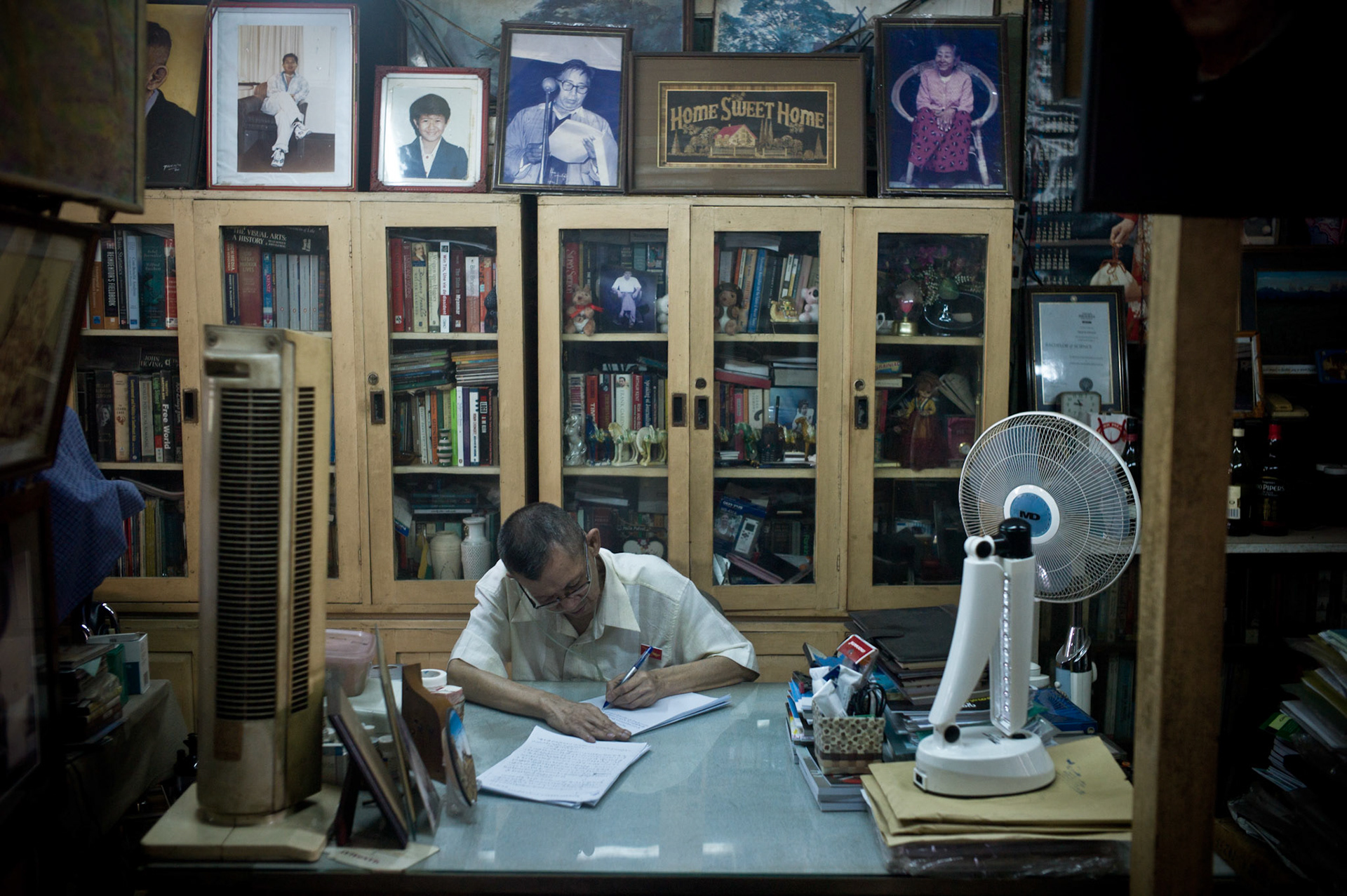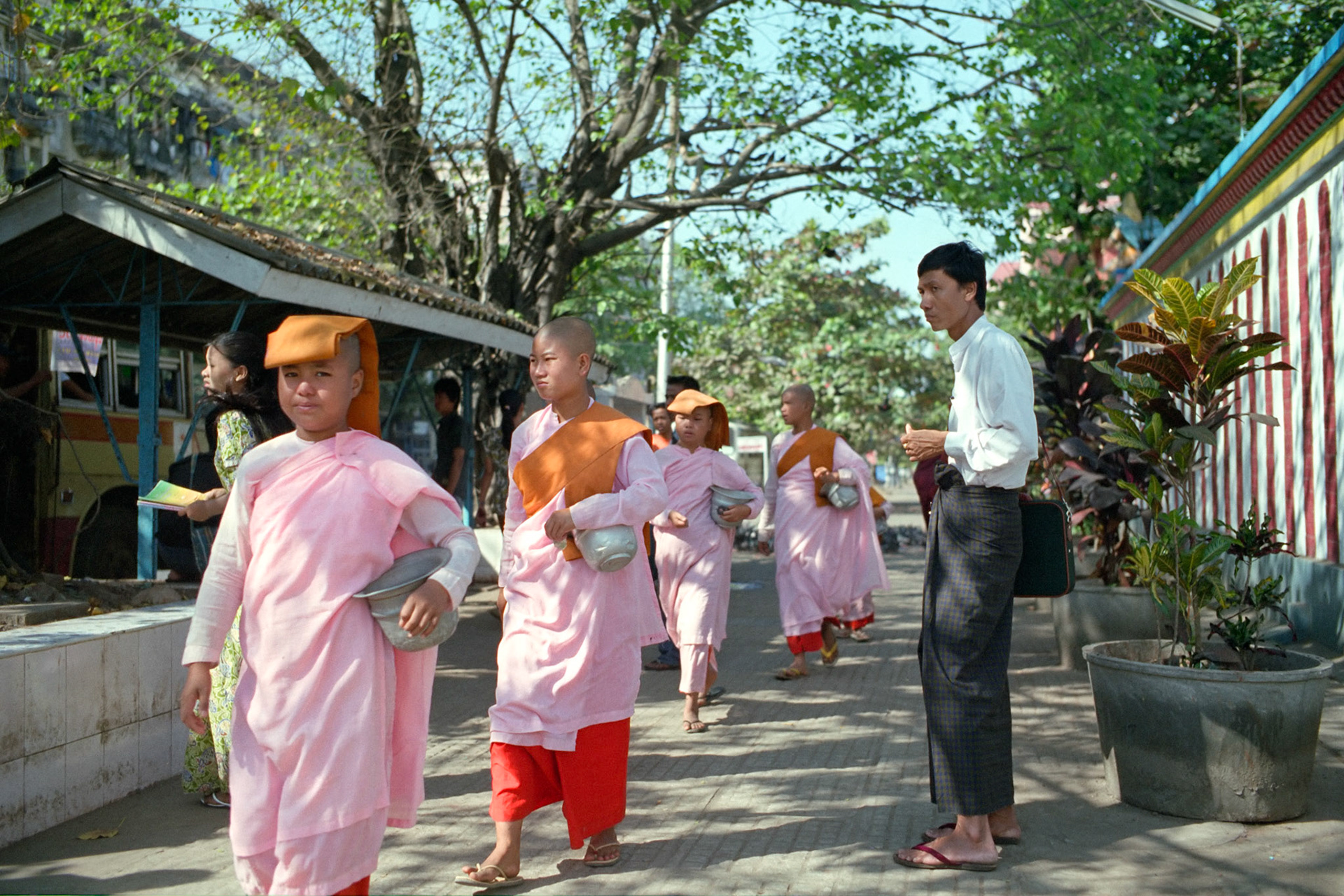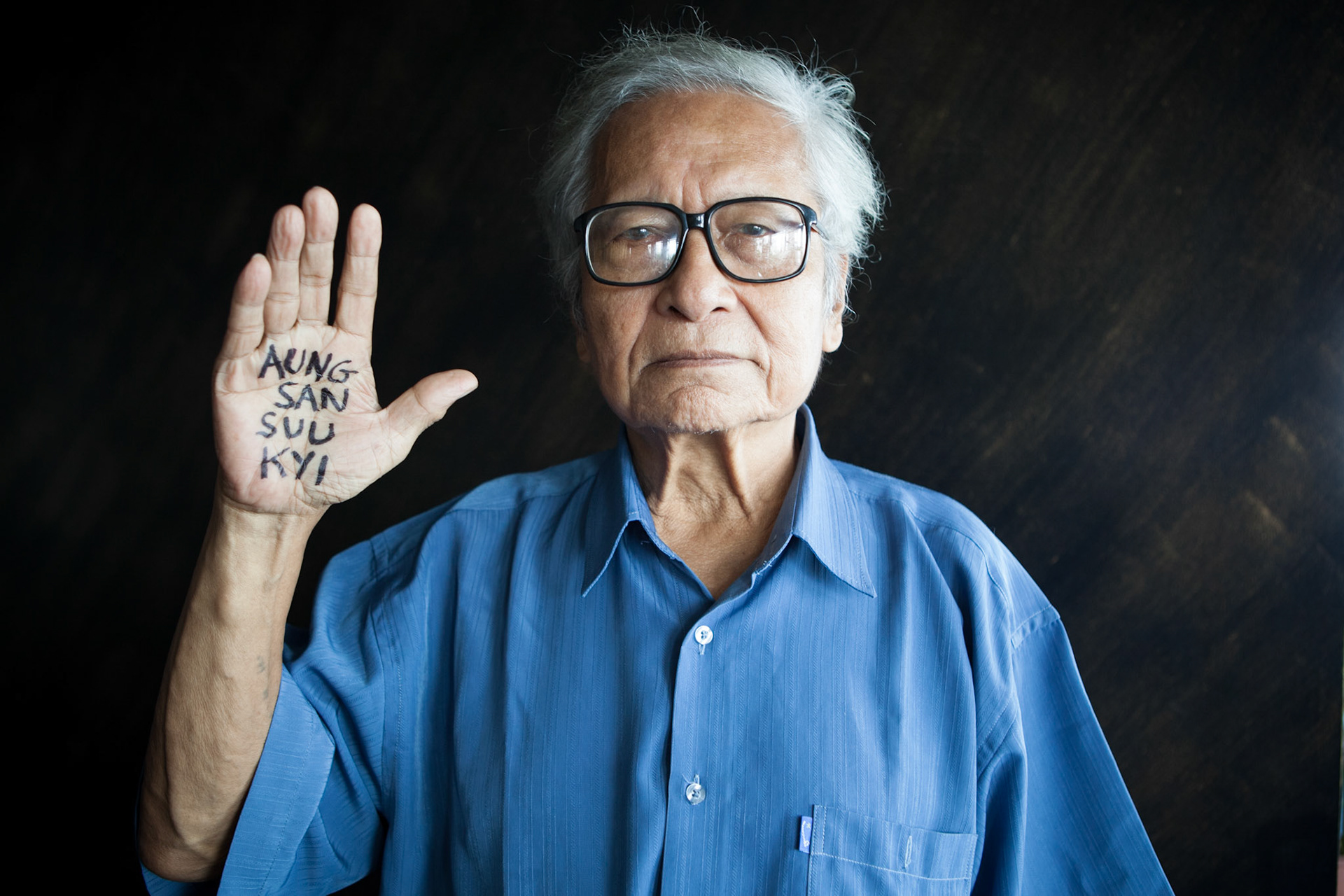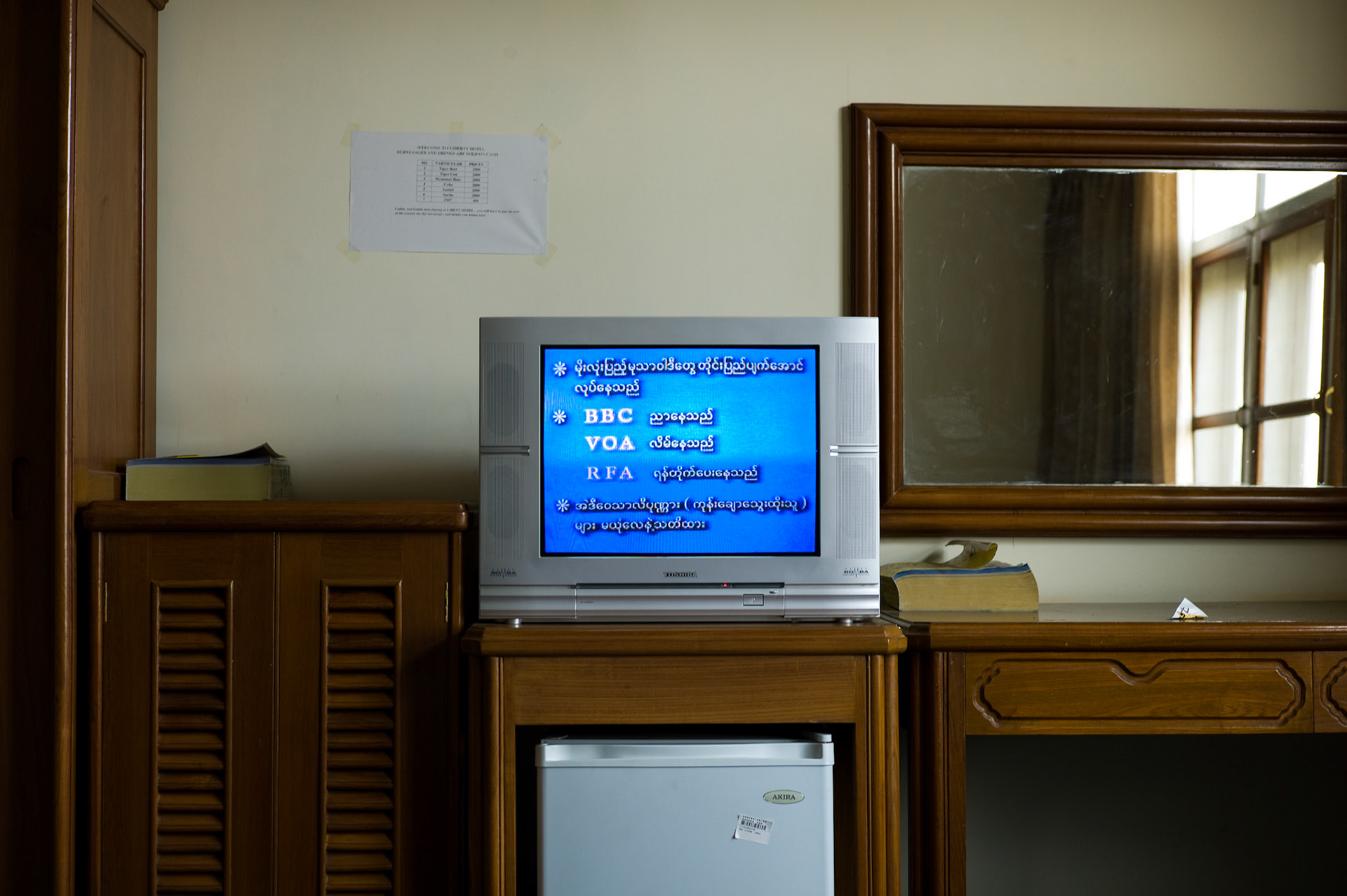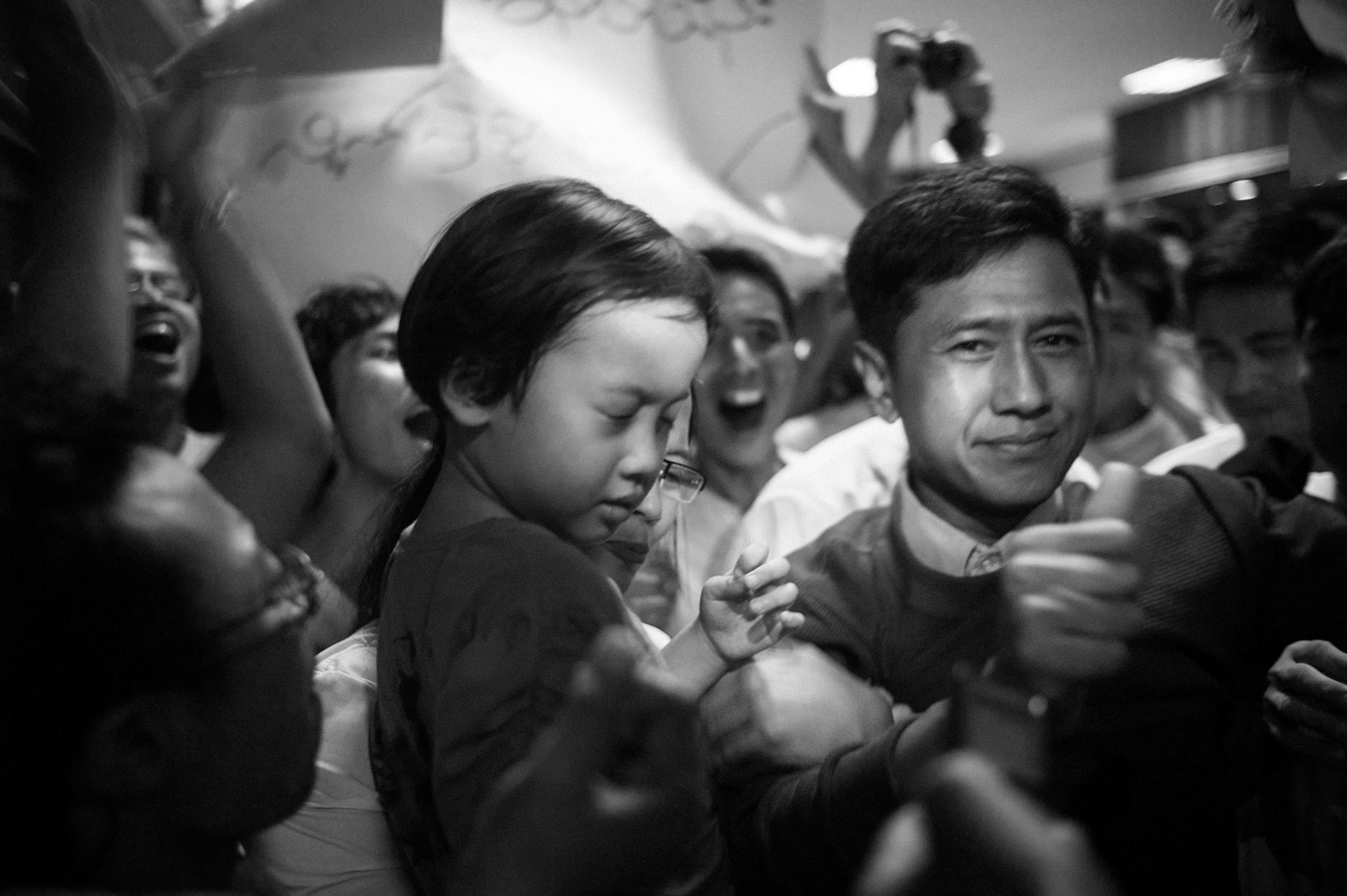
Street traders in downtown Rangoon struggle to survive in the poverty stricken country. Burma has become one of the poorest in the world with estimated more than 30% of the population living on or below the poverty line

Aung San Suu Kyi at her home in University Avenue, Rangoon. Burma's democracy icon and leader of the opposition party, the National League for Democracy (NLD), spent more than 15 years under house arrest in her lakeside home and Insein prison. She was released from her latest sentence in November 2010 and now continues to work tirelessly to achieve democracy and national reconciliation in Burma in spite of threats and oppression from the ruling miltary regime

Government propaganda is prevalent throughout Burma warning people of the dangers of ‘internal and external destructive elements’. The ‘People’s Desire’ has become a mantra for the authorities that is printed daily in state controlled newspapers and appears on signs throughout the country.

Bo Kyi, former political prisoner and co-founder of the Assistance Association for Political Prisoners (AAPP) works tirelessly to secure the release of more than 2,000 Burmese people who have been jailed for their political beliefs. In 1990 he was arrested and spent more than seven years in Burma's notorious prisons before fleeing to the Thai-Burma border. In 2009 his work and that of his organisation was rewarded with the Alison Des Forges Award for Extraordinary Activism.

A man lies severely ill from malaria in the in-patient ward at the Mae Tao Clinic on the Thai-Burma border. Approximately 300 people per day receive free healthcare at the clinic, mostly being migrant workers and refugees who have fled across the border from Burma (Myanmar) to escape the desperate poverty and persecution from the ruling military regime. Healthcare is all but non-existent in Burma, where less than 2% of the GDP is spent on healthcare and education combined.

U Tin Oo, former vice-chairman of Burma's National League for Democracy sits in his office at the party headquarters in Rangoon. He has spent more than 17 years in prison and under house arrest due to his political activities in Burma, being first arrested in 1976 and charged with high treason. He has been arrested 3 times and was released from his latest sentence in February 2010.

A soldier from the Karen National Liberation Army (KNLA) looking out over the Moie river keeps watch at the headquarters of 7th Brigade in Karen State, Burma.

Twenty three year old Yin Yin Aye was diagnosed with HIV six months ago. She has been at the clinic for one week and has now started to receive ARV treatment. Phyu Phyu Thin’s HIV/AIDS clinic in South Dagon, Rangoon, where more than 200 patients receive free treatment and care. There are an estimated 336,000 HIV positive people in Burma, yet only 10% receive treatment in a country where the government spends the least percentage of its GDP on health care of any country in the world.

A Soldier from the Burmese army on patrol through a monastery in Central Burma.

U Eindaka, the abbot of Maggin monastery, stands in the middle of a room surveying the remnants of the devastation caused four years ago when he and his fellow monks were arrested. On September 26th 2007, at the height of Burma's monk led Saffron Revolution, Maggin Monastery in Rangoon, was raided as the regime commenced its brutal crackdown on the protests. On 13th January 2012 the monks were released from prison and more than four years since the monastery was raided and locked, they returned and opened the doors once more. Everything they found was exactly as it was left the night the military regime arrested them and ransacked the buildings.

Daw Htwe Kyi and her 45 year old daughter Ma Win Ma who has been recently confirmed HIV positve. Ma Win Ma has started a programme of ARV drugs to combat the onset of the illness at Phyu Phyu Thin’s HIV/AIDS clinic in South Dagon, Rangoon, where more than 200 patients receive free treatment and care. There are an estimated 336,000 HIV positive people in Burma, yet only 10% receive treatment in a country where the government spends the least percentage of its GDP on health care of any country in the world.

U Gambira, a former child soldier in the Burmese army at the age of 12, became a monk when his parents rescued him from the army. When the 88 Generation Students lead protests against the regime in August 2007 he help found the All Burma Monks Alliance and was instrumental in organising the monk lead Saffron Revolution. He was arrested in November 2007 having been in hiding and was sentenced to 68 years in prison. During his time in jail he was brutally tortured and de-robed from monkhood. He was released from prison on 13th January 2012 under a presidential amnesty and has immediately returned to continue his political activities working to bring democracy to Burma

Soldiers from the Burmese army stop and search a truck in central Burma. The Burmese authorities keep a strict control on the public, allowing no form of dissent to their authoritarian rule.

Plain clothed Military Intelligence officers photograph political dissidents and opposition party members including the 88 Generation Students and leading members of the National League for Democracy at a ceremony being held in a monastery in Rangoon. Underneath the veil of the new Burmese Government's democratic change the oppressive nature of the previous military regime continues unabated in Burma

Policemen wait outside a teashop in downtown Rangoon whilst intelligence offiers search inside

Ludu U Sein Win, one of Burma's most famous and respected journalists is also one of the most outspoken critics of the ruling regime. For decades his articles and writings have openly defied the authorities strict censorship rules but his condemnation has has had its price to pay. In 1967 he was sentenced without trial to 13 years in prison for his political writings, being jailed in Insein prison and Coco Island. He was released in 1976 but was re-arrested almost immediately and jailed for a further 4 years. He suffered a stroke in prison and despite being paralysed in his right side and in need of oxygen to aid his breathing he continues to defy the regime in writing two articles every day under a guise of different pseudonyms.

Young novice nuns walk through the streets of downtown Rangoon early in the morning collecting their alms. Buddhism plays a vital role in Burmese culture and society.

U Win Tin, former journalist, writer and founding member of the NLD, was arrested in 1989 because of his political activities and close association to Aung San Suu Kyi. He was jailed for 19 years in Insein prison, mostly in solitary confinement. His sentence was increased whilst in prison when he secretly published anti-government propaganda. He was released in 2008 and despite his age, he still works as a CEC member of the NLD in Rangoon, working endlessly for the release of political prisoners. He wears a blue shirt every day (like the prison uniform) to remind people of those still incarcerated.Daw Aung San Suu Kyi, Burma's democracy icon and leader of the NLD, has spent more than 15 years under house arrest in her lakeside home and Insein prison. She was released from her latest sentence in November 2010 and continues to work tirelessly to achieve democracy and national reconciliation in Burma in spite of constant threats and oppression from the authorities.

State controlled television channel MRTV broadcasts public announcements constantly warning the Burmese people against the 'saboteurs and 'destructionists sowing hatred'. Exiled media like Radio Free Asia, Voice of America, Democratic Voice of Burma as well as the BBC play a vital role in getting news out of Burma in a country where there is no press freedom and journalists are routinely jailed

Crowds overwhelmed with joy mob leading Burmese political dissidents Ko Jimmy and his wife Nilar Thein as they are re-united once again with their daughter having both just been released from the 65 year prison sentences they were serving. The Presidential amnesty saw more than 600 political prisoners released from prison, many of who were former leaders of the mass democracy uprising in 1988 and were serving long sentences of 65 years or more.
